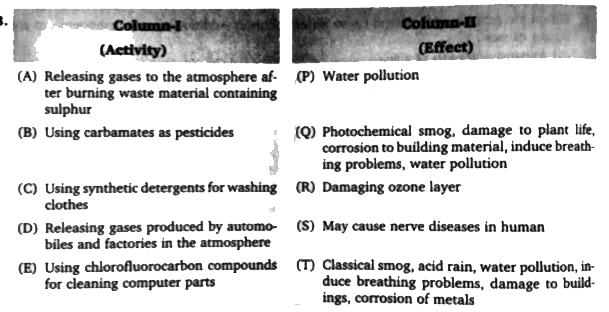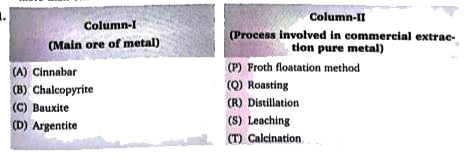Column-I and Column -II contains four entries each. Entries of Column-I are to be matched with some entries of Column-II. One or more than one entries of Column-I may have the matching with the same entries of Column-II.

The correct Answer is:A, B, C, D
Step by step video & image solution for Column-I and Column -II contains four entries each. Entries of Column-I are to be matched with some entries of Column-II. One or more than one entries of Column-I may have the matching with the same entries of Column-II. by Chemistry experts to help you in doubts & scoring excellent marks in Class 12 exams.
Updated on:21/07/2023Topper's Solved these Questions
- CHEMICAL BONDING (ADVANCED)BOOK - VK JAISWAL ENGLISHCHAPTER - CHEMICAL BONDING (ADVANCED)EXERCISE - ASSERTION-REASON TYPE QUESTIONS
57 Videos
- CHEMICAL BONDING (ADVANCED)BOOK - VK JAISWAL ENGLISHCHAPTER - CHEMICAL BONDING (ADVANCED)EXERCISE - SUBJECTIVE PROBLEMS
64 Videos
- CHEMICAL BONDING (ADVANCED)BOOK - VK JAISWAL ENGLISHCHAPTER - CHEMICAL BONDING (ADVANCED)EXERCISE - ONE OR MORE ANSWER IS/ARE CORRECT
78 Videos
- CHEMICAL BONDING (BASIC)BOOK - VK JAISWAL ENGLISHCHAPTER - CHEMICAL BONDING (BASIC)EXERCISE - SUBJECTIVE PROBLEMS
54 Videos
Similar Questions
Column-I and Column-II contains fore enteries each. Entries of Column-I are to be matched with, some entries of Column-II One or more than one entries of Column-I may have the mathching with the same entries of Column-II

View SolutionColumn-I and Column-II contains four entries each. Entries of Column-I are to be matched with some entries of Column-II. Each entry of Column-I may have the matching with one or more than one entries of Column-II

View SolutionColumn-I and Column-II contains four entries each. Entries of Column-I are to be matched with some entries of Column-II. Each entry of Column-I may have the matching with one or more than one entries of Column-II

View SolutionColumn-I and Column-II contains four entries each. Entries of Column-I are to be matched with some entries of Column-II. Each entry of Column-I may have the matching with one or more than one entries of Column-II

View SolutionColumn-I and Column-II contains four entries each. Entries of Column-I are to be matched with some entries of Column-II. Each entry of Column-I may have the matching with one or more than one entries of Column-II

View SolutionColumn-I and Column-II contains four entries each. Entries of column-I are to be matched with some entries of column-II. Each entry of column-I may have the matching with one or more than one entries of column-II.

View SolutionColumn-I and Column-II contains four entries each. Entries of column-I are to be matched with some entries of column-II. Each entry of column-I may have the matching with one or more than one entries of column-II.

View SolutionColumn-I and Column-II contains four entries each. Entries of column-I are to be matched with some entries of column-II. Each entry of column-I may have the matching with one or more than one entries of column-II.

View SolutionColumn-I and Column-II contains four entries each. Entries of column-I are to be matched with some entries of column-II. Each entry of column-I may have the matching with one or more than one entries of column-II.

View SolutionColumn-I and Column-II contains four entries each. Entries of column-I are to be matched with some entries of column-II. Each entry of column-I may have the matching with one or more than one entries of column-II.

View Solution
